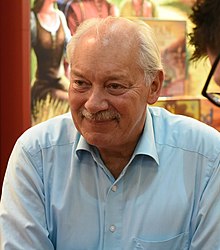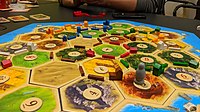Career
Teuber worked as a dental technician for his business Teuber Dental-Labor near Darmstadt, but he was not happy in this work. In the 1980s, he designed his first game, Barbarossa, inspired by the fantasy trilogy, The Riddle-Master, by Patricia A. McKillip. In the game, players make sculptures out of modelling clay, and try to guess what the objects represent. After working on the game for seven years, Teuber finally showed Barbarossa to a publisher; the game was awarded the prestigious Spiel des Jahres (Game of the Year) in 1988.
Teuber went on to win the award three more times, for the games Adel Verpflichtet (Hoity Toity) in 1990, Drunter und Drüber (Wacky Wacky West) in 1991, and Die Siedler von Catan (The Settlers of Catan) in 1995.
The Settlers of Catan
In 1991, Teuber started designing The Settlers of Catan, inspired by the history of Viking settlers in Iceland. He took four years to develop the island-settling game; his major breakthrough was when he introduced hexagonal tiles instead of using squares to represent wood, ore, brick, wool, and wheat. Catan has been credited with launching a new more "social" era for board games, introducing bargaining and bartering among players as part of the strategy to win.
The commercial success of Catan allowed Teuber to become a full-time game designer in 1998. The family game business was incorporated as Catan GmbH in 2002 and his sons Benjamin and Guido are directors while his wife Claudia and his daughter also have roles as bookkeeper and tester.
The popularity of Catan continued to grow, eventually translated into 40 languages, with multiple expansions, geographically themed versions, a card game, a version for young children, a video game, and online versions, as well as a novel and other spinoffs. For the development of the video game adaptation of Catan, Teuber created a Microsoft Excel spreadsheet with "elaborate logic chains and probability matrices" so that the developers could determine the effects of each action on gameplay.
In 2020, sales of Catan surged during the first five months of the global COVID-19 pandemic, as board games became popular during the worldwide lockdown. As of 2023, more than 40 million copies of Catan have been sold worldwide.
Despite the success of Catan, Teuber was described as remaining down to earth. In 2023, Dan Zak wrote in The Washington Post, "Among hobbyists and gamers he was revered like a rock star, but he looked and acted and sounded like a man who tinkered with stuff in his basement...He was, at heart, a hobbyist." When Teuber was asked why he thought Catan was so popular, he said it may have been due to a "good balance between strategy and luck".

